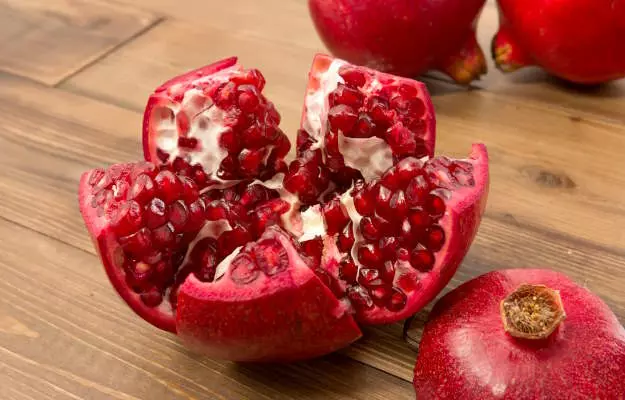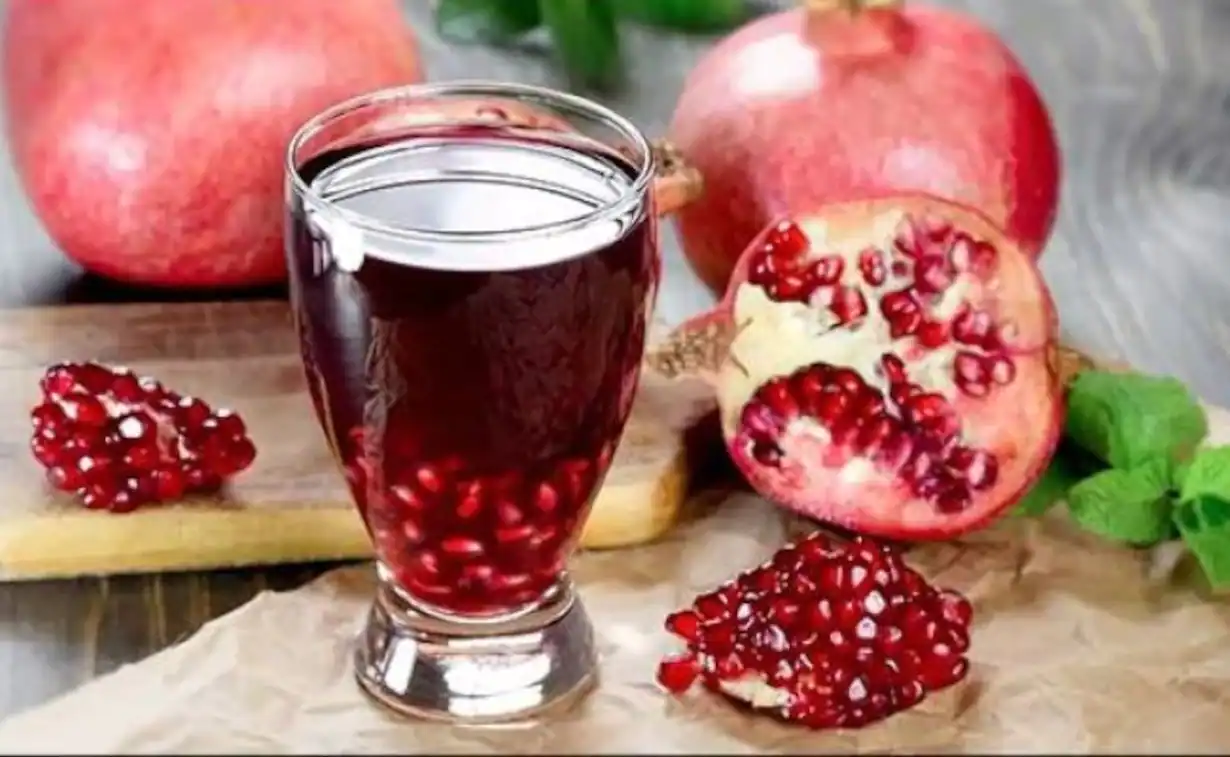Exercise Daily – Pomegranates, the ruby-red fruits of the Punica granatum tree, have long been revered for their nutritional richness and potential health benefits. In recent years, scientific research has delved into the specific effects of pomegranates on cardiovascular and diabetic health, uncovering promising evidence that these vibrant fruits may significantly promote overall well-being.
Pomegranates are packed with abundant nutrients, including antioxidants, polyphenols, vitamins, and minerals, making them a true powerhouse of health. Their antioxidant content is particularly noteworthy, with pomegranate juice containing significantly higher levels of antioxidants than other commonly consumed fruits, such as oranges, grapes, and apples.
Pomegranate: A Nutrient-Rich Powerhouse
Beyond its wealth of polyphenols, pomegranate offers a rich tapestry of nutrients, including:
- Vitamin C: A potent antioxidant that supports immune function and collagen production
- Vitamin K: Essential for blood clotting and bone health
- Potassium: Regulates blood pressure and muscle function
- Fiber: Promotes digestive health and satiety
The potential benefits of pomegranates for cardiovascular and diabetic health are attributed to their rich antioxidant profile, which helps combat free radicals and oxidative stress. These free radicals, byproducts of cellular metabolism, can damage cells and contribute to chronic diseases such as heart disease and diabetes.
Pomegranate’s Antioxidant Powerhouse
Pomegranates are brimming with antioxidants, particularly polyphenols, which have potent anti-inflammatory and antioxidant properties. These antioxidants include anthocyanins, ellagic acid, punicalagin, and flavonoids, which protect cells from damage and promote overall health.
Studies have shown that the antioxidant content of pomegranates is significantly higher than other fruits and vegetables. For instance, a study published in the journal “Nutrition Research” found that pomegranate juice had an antioxidant capacity over 20 times higher than that of orange juice.
Pomegranates are renowned for their exceptional antioxidant content, particularly punicalagin, a potent polyphenol compound. These antioxidants combat oxidative stress, a key factor in the development of atherosclerosis, the narrowing of arteries caused by plaque buildup.
By neutralizing harmful free radicals, pomegranate antioxidants protect LDL (low-density lipoprotein) cholesterol from oxidation, preventing its transformation into the atherogenic form that contributes to plaque formation.
Pomegranate’s Impact on Cardiovascular Health
Numerous studies have investigated the potential benefits of pomegranates for cardiovascular health. These studies have shown that pomegranates can:
1. Lower blood pressure
Pomegranate juice has been shown to effectively lower both systolic and diastolic blood pressure, which are major risk factors for heart disease. This fruit’s ability to inhibit the production of angiotensin-converting enzyme (ACE), which plays a role in blood pressure regulation, is credited for this effect.
Studies have demonstrated the ability of pomegranate juice to lower blood pressure, a crucial factor in cardiovascular health. Pomegranate’s bioactive compounds may enhance nitric oxide production, a vasodilator that relaxes blood vessels, promoting smoother blood flow and reducing blood pressure.
2. Reduce cholesterol levels
Pomegranate juice can help lower LDL (bad) cholesterol levels and increase HDL (good) cholesterol levels. This beneficial effect is thought to be due to the fruit’s ability to protect LDL cholesterol from oxidation. This process makes it more likely to form harmful plaques in arteries.
Pomegranate consumption has been linked to improved cholesterol profiles. Pomegranate’s antioxidant properties may protect HDL (high-density lipoprotein) cholesterol, the “good” cholesterol, from oxidation, preserving its ability to remove harmful LDL cholesterol from the bloodstream. Moreover, pomegranates may aid in reducing LDL cholesterol levels directly, further contributing to cardiovascular health.
3. Combat inflammation
Pomegranate juice has potent anti-inflammatory properties that can help reduce chronic inflammation, a key factor in the development of atherosclerosis. This effect is attributed to the fruit’s high antioxidant content, which helps neutralize free radicals and reduce inflammation-causing molecules.
Chronic inflammation plays a significant role in the progression of cardiovascular diseases. Pomegranate’s anti-inflammatory properties may help mitigate inflammation by inhibiting the production of inflammatory cytokines and reducing oxidative stress. This anti-inflammatory effect may contribute to plaque stabilization and reduce the risk of cardiovascular events.
4. Protect against atherosclerosis
Pomegranate juice can help prevent the formation of atherosclerotic plaques and fatty deposits that narrow arteries and increase the risk of heart attack and stroke. Whereas, this protective effect is attributed to the fruit’s ability to inhibit plaque formation and rupture, maintain arterial elasticity, and promote healthy blood flow.
5. Enhance endothelial function
Moreover, pomegranate juice enhances endothelial function, vital for maintaining healthy blood vessels. Endothelial cells, which line the inner walls of blood vessels, are pivotal in regulating blood pressure, blood clotting, and inflammation. The antioxidant and anti-inflammatory properties of pomegranate aid in preserving endothelial health and optimal function.

Pomegranate’s Promise for Diabetic Management
Pomegranates have also shown promise in the management of diabetes. Studies have demonstrated that pomegranates can:
1. Improve insulin sensitivity
Pomegranate juice can help improve insulin sensitivity, which is the body’s ability to respond to insulin. Insulin is a hormone that regulates blood sugar levels, and people with insulin resistance have difficulty processing glucose, leading to elevated blood sugar.
Insulin resistance, a hallmark of diabetes, occurs when cells become less responsive to insulin, hindering glucose uptake. Pomegranate’s ability to promote insulin sensitivity may be attributed to its anti-inflammatory properties and potential to modulate insulin signaling pathways.
2. Increase glucose uptake
Pomegranates have demonstrated promising effects on glycemic control in individuals with diabetes. Pomegranate’s bioactive compounds may enhance insulin sensitivity, allowing cells to better utilize insulin for glucose uptake, leading to lower blood sugar levels. Additionally, pomegranate consumption may slow carbohydrate absorption, preventing blood sugar spikes after meals.
Furthermore, pomegranate juice can enhance glucose uptake by cells, thereby aiding in reducing blood sugar levels. This outcome is credited to the fruit’s capacity to stimulate the production of GLUT4, a protein pivotal in facilitating glucose uptake into cells.
3. Reduce oxidative stress and inflammation
Pomegranate juice can help reduce oxidative stress and inflammation associated with diabetes. This effect contributes to improved insulin sensitivity and glucose control.
4. Protect against diabetic complications
Pomegranate juice has shown potential in reducing the risk of diabetic complications, such as cardiovascular diseases, neuropathy, and retinopathy. By improving insulin sensitivity, reducing oxidative stress, and modulating inflammation, pomegranates can help protect against the long-term consequences of diabetes.
Chronic complications associated with diabetes, such as neuropathy, retinopathy, and nephropathy, are often linked to oxidative stress and inflammation. Pomegranate’s antioxidant and anti-inflammatory properties may help protect against these complications by reducing oxidative damage and mitigating inflammatory processes.

Incorporating Pomegranate into Your Diet
Incorporating pomegranates into your diet is a delicious and nutritious way to reap their potential health benefits. Here are a few ways to enjoy pomegranates:
Enjoy pomegranate arils as a snack: Pomegranate arils are the juicy seeds of the pomegranate packed with nutrients and flavor. Cut open a pomegranate and enjoy the arils alone, or add them to salads, yogurt, granola bowls, or smoothies.
Add pomegranate juice to smoothies or beverages: Pomegranate juice offers a concentrated source of antioxidants and nutrients. Add a splash of pomegranate juice to your smoothies, water, or sparkling water for a boost of flavor and health benefits.
Incorporate pomegranate molasses into culinary creations: Pomegranate molasses is a thick, sweet syrup made from juice. It adds a tangy, sweet flavor to sauces, marinades, glazes, and desserts.
Recommended Dosage of Pomegranate
Though there isn’t a universal recommendation for pomegranate consumption, typical guidelines advise adults to consume up to 2-3 cups of juice or 1 cup of pomegranate arils daily. However, it’s advisable to commence with a smaller quantity and progressively raise it as tolerated.
Potential Side Effects of Pomegranate
Pomegranates are generally safe for most people when consumed in moderation. However, some potential side effects include:
Interactions with certain medications: Pomegranate juice may interact with certain medications, such as blood thinners and medications for high blood pressure. If you are taking any medications, it’s important to consult with your doctor before incorporating pomegranates into your diet.
Allergic reactions: In rare cases, people may experience allergic reactions to pomegranate, such as skin rash, itching, or hives. If you experience any allergic reactions, discontinue consumption and seek medical attention if necessary.
Home Remedies of Pomegranates
Harnessing the power of pomegranate for cardiovascular and diabetic health can be achieved through a variety of simple home remedies:
1. Pomegranate Juice:
Moreover, indulging in a freshly squeezed glass of unsweetened pomegranate juice from a high-quality source is a potent method to harness the benefits of pomegranate. Consistent intake of pomegranate juice can contribute to lowering blood pressure, decreasing LDL (bad) cholesterol levels, and elevating HDL (good) cholesterol levels, thereby fostering a healthier cardiovascular profile.
2. Pomegranate Seeds:
Moreover, sprinkling pomegranate seeds over salads, yogurt, or cereal enhances flavor and boosts nutritional value. These seeds are abundant in ellagic acid, a powerful antioxidant known for its anti-inflammatory and anti-cancer properties.
3. Pomegranate Peel Powder:
Additionally, when ground into a powder, dried pomegranate peel serves as a versatile addition to smoothies, tea, or baked goods. Pomegranate peel powder, a concentrated source of antioxidants, has demonstrated efficacy in reducing inflammation and enhancing blood sugar control.
4. Pomegranate Vinegar:
Drizzling pomegranate vinegar over salads or using it as a marinade adds a tangy flavor while providing health benefits. Pomegranate vinegar contains acetic acid, which has been shown to improve insulin sensitivity and lower blood sugar levels.
5. Pomegranate Molasses:
Furthermore, Pomegranate molasses, a dense and sweet syrup, is an excellent sweetening agent in desserts, sauces, or beverages. Rich in antioxidants, this molasses has demonstrated its ability to diminish inflammation and enhance control over blood sugar levels.
Incorporating these pomegranate home remedies into daily life can provide a natural and effective way to support cardiovascular and diabetic health. However, consulting with a healthcare professional before significantly changing one’s diet or supplement regimen is crucial.

Conclusion
Pomegranates emerge as a promising dietary addition for individuals seeking to promote cardiovascular and diabetic health. Their rich antioxidant content and potential to modulate various metabolic pathways suggest their ability to protect against cardiovascular diseases and improve diabetes management. While further research is warranted to fully elucidate the mechanisms underlying these benefits, incorporating pomegranates into a healthy lifestyle may hold significant advantages for overall well-being.
FAQs – Pomegranate’s Benefits for Cardiovascular and Diabetic Health
Q: What is the best way to consume pomegranates?
The best way to consume pomegranates is to enjoy the arils as a snack or add them to smoothies, salads, yogurt, or granola bowls. You can add pomegranate juice to smoothies or beverages or incorporate pomegranate molasses into culinary creations.
Q: Are there any specific types of pomegranates that offer more health benefits?
All varieties of pomegranates offer similar health benefits due to their consistent antioxidant content. However, some varieties may have higher levels of specific antioxidants, such as anthocyanins or punicalagins. To maximize your pomegranate intake, you can explore different varieties to find one that suits your taste preferences.
Q: How does pomegranate juice compare to whole pomegranate arils regarding health benefits?
Both pomegranate juice and whole pomegranate arils offer similar health benefits. However, pomegranate juice is more concentrated, providing more antioxidants and nutrients per serving. This makes incorporating pomegranates into your diet convenient, especially if you don’t have time to eat the arils directly.
Q: Can pomegranate supplements provide the same benefits as consuming the fruit itself?
Meanwhile, pomegranate supplements can provide some of the antioxidants and nutrients found in the fruit. But they may not be as effective as consuming the whole fruit. This is because supplements may not contain the same variety of antioxidants and cofactors naturally present in pomegranates. Additionally, supplements may not have the same fiber content as whole pomegranates, which affects digestion and overall health.
Q: Who should consult their doctor before incorporating pomegranates into their diet?
Individuals who are taking certain medications. Such as blood thinners or medications for high blood pressure. They should consult with their doctor before incorporating pomegranates into their diet. This is because pomegranates may interact with these medications and alter their effects. Additionally, individuals with a history of allergies should be cautious when consuming pomegranates for the first time, as they may experience allergic reactions.





